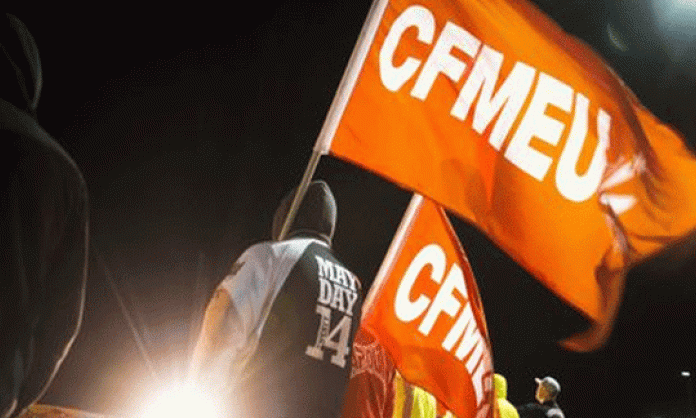Unions have lost a major showdown over fly-in fly-out (FIFO) rosters in the resources sector. A ten month dispute with Bechtel on Curtis Island ended on 15 August with a slim majority voting to accept a company offer. The result means that Bechtel’s FIFO workforce will remain on a 4/1 (four weeks on, one week off) roster until the final six months of its $70 billion liquefied natural gas (LNG) project – at least two years away.
It was Bechtel’s third attempt to get an agreement and was approved by just 54 percent of the workforce. “People will breathe a sigh of relief”, Mark Samter, an energy market analyst, told business news outlet Bloomberg after the narrow “yes” vote. “They pushed our faces in the mud yesterday”, said one worker who voted no, “and today they have their foot on the back of our heads”. The defeat is a setback for a wider push to establish shorter rosters for fly-in fly-out workers as standard across the country.
Construction, Forestry, Mining and Energy Union (CFMEU) Queensland divisional branch secretary Jade Ingham spoke to Red Flag about the result. He said Bechtel shouldn’t rest easy. “You had 46 percent vote no”, he said, “half the job are unhappy, half the site don’t want the agreement that they’re now going to be working under … that’s gonna have some major impacts on productivity for the rest of the job.”
Bechtel is a global goliath. A privately owned 116-year-old family-run company, it doesn’t release profit details, but an annual revenue of $38 billion makes it the largest construction and engineering company in the US. Bechtel says that its construction of three separate LNG plants, or “mega-projects”, on Curtis Island is “the greatest concentration of Bechtel projects anywhere in the world”.
A ferry ride from the industrial town of Gladstone in Queensland’s north, Curtis Island is home to around 6,000 FIFO workers. Another 2,500 or so “local” workers are based in Gladstone and travel to the island each day. Since 2013 most unions (AMWU, ETU, CEPU and CFMEU) representing workers on the island have been pushing for improvements to conditions for FIFO workers, who work 10-hour days, six days a week with a one-week break for every four weeks on the job. Local workers, robbed of time at home by long and mostly unpaid travel times to and from the island, also wanted a change.
With proposals twice rejected by ballot, the company was forced to give ground on a number of fronts in its third offer – including providing extra travel allowances. But the workers’ key claim, the immediate implementation of a 3/1 (three weeks on, one week off) roster, was not accepted. Bechtel – which built the Hoover Dam and lists among its other achievements the construction of 25 new towns, 95 airports, 80 ports and nearly 30,000 km of road – cited logistical difficulties and claimed that a roster change would be too complicated to implement immediately.
The fight for 3/1 reached a peak in the days leading up to the ballot with members of the CFMEU starting strike action on 7 August. Pickets were set up at the two ferry terminals from which workers go to and from the island. The CFMEU was the only union to jump through the Fair Work hurdles in time to allow its members to take protected industrial action prior to the third ballot.
Despite this, Ingham described the support for picketing CFMEU members from workers in other unions as “excellent”. While figures are disputed by Bechtel, it is understood that many refused to cross the picket line.
Ingham says that despite not defeating the company’s ballot, CFMEU members aren’t disheartened. “They feel let down by some of the dirty tricks that were played out … the employer certainly wasn’t playing with a straight bat. They’re proud of what they did though.”
He describes the result at Curtis Island as a battle lost. “I think the war ultimately will be won for shortened rosters”, he said. “Our members can hold their heads high in that they put rosters and working hours and their families on the map with this dispute.”
Nationally, the campaign for shorter rosters continues. Workers on a number of major resources projects in Western Australia remain in dispute over the issue.











